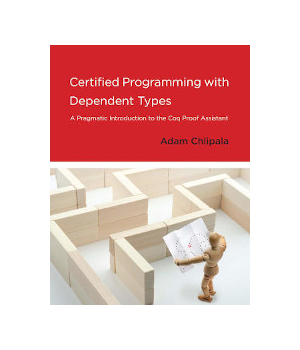Certified Programming with Dependent Types
The technology of mechanized program verification can play a supporting role in many kinds of research projects in computer science, and related tools for formal proof-checking are seeing increasing adoption in mathematics and engineering. This book provides an introduction to the Coq software for writing and checking mathematical proofs. It takes a practical engineering focus throughout, emphasizing techniques that will help users to build, understand, and maintain large Coq developments and minimize the cost of code change over time. Two topics, rarely discussed elsewhere, are covered in detail: effective dependently typed programming (making productive use of a feature at the heart of the Coq system) and construction of domain-specific proof tactics. Almost every subject covered is also relevant to interactive computer theorem proving in general, not just program verification, demonstrated through examples of verified programs applied in many different sorts of formalizations. The book develops a unique automated proof style and applies it throughout; even experienced Coq users may benefit from reading about basic Coq concepts from this novel perspective. The book also offers a library of tactics, or programs that find proofs, designed for use with examples in the book. Readers will acquire the necessary skills to reimplement these tactics in other settings by the end of the book.
Download free tutorial in PDF (368 pages) created by Adam Chlipala .
| Pages : | 368 |
| Size : | |
| File type : | HTML |
| Downloads: | 193 |
| Created: | 2021-05-15 |
| License: | Free |
| Author(s): | Adam Chlipala |

Warning: Trying to access array offset on false in /home/tutovnfz/public_html/article.php on line 233
Others Certified Programming Tutorials
Others related eBooks about Certified Programming with Dependent Types
Open Data StructuresDownload free course Open Data Structures, pdf file on 336 pages by Pat Morin....
Exploring Data ScienceThere's never been a better time to get into data science. But where do you start? Data Sc..., download free Data Science tutorial in PDF (186 pages) created by ....
S-BPM in the WildDownload free course S-BPM in the Wild, pdf file on 284 pages by Albert Fleischmann, Werner Schmidt, Christian Stary....
Functional Programming in OCamlThis book is about making you a better programmer. It gives you the opportunity to now learn a new language from scratch and reflect along the way about the difference between programming and programming in a language....
Basic Encryption and DecryptionThis is a complet guide about encryption and decrytion data, free pdf tutorial in 37 pages for beginner's by H. Lee Kwang ....
The Tiny Book of RulesDownload free course The Tiny Book of Rules, pdf file on 15 pages by Johan Falk, Wolfgang Ziegler....
Microsoft Dynamics NAV AdministrationMicrosoft Dynamics NAV is an Enterprise Resource Planning (ERP) software product that inte..., download free NAV Administration tutorial in PDF (190 pages) created by Amit Sachdev ....
Interpretable Machine Learning: A Guide for Making Black Box Models ExplainableThis book explains to you how to make (supervised) machine learning models interpretable....
Git Notes for ProfessionalsDownload free course Git Notes for Professionals, pdf file on 194 pages by Stack Overflow Community....
Category Theory for ProgrammersCategory Theory is one of the most abstract branches of mathematics. It is usually taught ..., download free Category Theory tutorial in PDF (498 pages) created by Bartosz Milewski ....